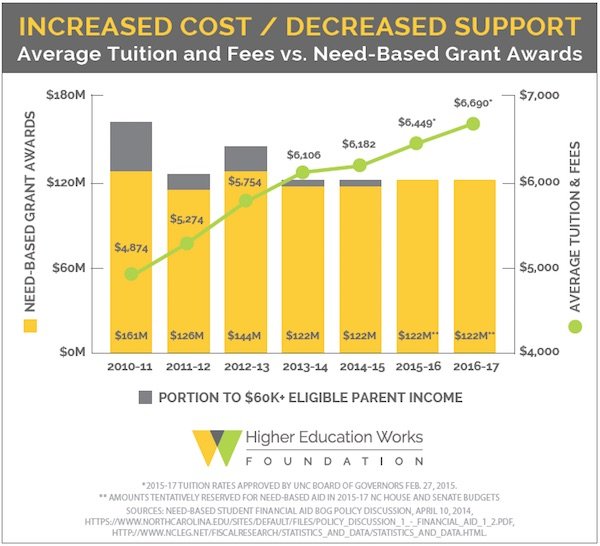By Erskine Bowles
News reports and economic journals written by both conservatives and progressives today rightly focus on the lack of economic mobility. The data point out that Charlotte has an acute problem in this area, ranking 50th of the nation’s 50 largest cities in economic mobility.
Almost all the data point to education as the number one cure for this societal problem. In cities like my hometown of Charlotte, a child born to a family in the bottom one-fifth of income levels has less than a 5% chance of making it to the top fifth. But if that child gets a college degree, they are three times more likely to move up.
In North Carolina, our political, civic and business leaders have always understood the value of higher education to our citizens. Our state’s founders went so far as to specifically spell out in our state Constitution that education at our public university should “as far as practicable, be extended to the people of the State free of expense.” From day one, North Carolinians have understood the correlation between education and economic opportunity.
During my five years as president of North Carolina’s public universities, I worked hand in hand with our legislature and governor to expand state need-based aid to our students. Toward the end of my term, the legislature was providing over $160 million a year to the University for need-based aid.
When combined with federal Pell Grants, private contributions and work-study programs, this meant that even our most-expensive flagship University – UNC-Chapel Hill – could guarantee a young person coming from the bottom fifth of income levels that they not only could afford to go to college, but they could graduate nearly debt-free.
However, we didn’t focus just on those in the bottom tier of the income scale. We also wanted to make sure kids from middle-income parents could afford a college education and the opportunities it makes possible.
An examination of the demographics of the student body at UNC showed an increase in students at the bottom and top ends of the income scale, but a shrinking middle. The child of a police officer and a school teacher who combined made approximately $60,000 was not eligible for Pell Grants from the federal government and got very little from the state. The legislature changed that with its increased funding for need-based aid, so that the children of these parents could also afford to go to college.
Believe you me, I fully understand and appreciate the need for the legislature to operate in a fiscally responsible manner. I’ve spent a big portion of my career trying to get the federal government to be more fiscally responsible. I applaud the advances made by the current Board of Governors and President Tom Ross in the whole area of accountability.
But that increasingly important need-based aid provided by the state has been reduced by almost $40 million. At the same time, tuition and fees have increased, pricing higher education, that golden ticket to economic opportunity, out of the hands of North Carolina kids from both middle and lower-income families.
I am deeply worried by the long-term effects of these cuts in need-based aid for not only our neediest, but also for that child of the police officer and schoolteacher.
Today we live in what is clearly a knowledge-based global economy. If the citizens of North Carolina are to compete and win in this new world, we must have a highly trained, highly skilled workforce. Therefore, North Carolina must invest in our public schools, great Community Colleges and our public Universities so they are equipped to provide that quality education.
But future investment in higher education will go for naught if affordable access is not available to all income levels due to the scarcity of need-based aid.
I implore our legislature and governor to think through the long-term effects on our state and its citizens from decisions to reduce need-based aid. Decisions to cut this aid are like eating our seed corn in a world that requires knowledge as the key to economic mobility.
Erskine Bowles is President Emeritus of the University of North Carolina System and a supporter of Higher Education Works.


Susie Small says
I totally agree with Erskine and just pray that the Legislature will
change their ways with our education funding.
Thomas Williams says
As usual, your perspective is grounded in the current data and trends that have emerged in our ever changing and dynamic policy environment in both the economic and educational setting. As a life long K-12 educator, I encourage that we not leave out of this discussion the short and long-term impact this changing landscape has on the potential intrinsic motivation of our K-12 students. As current K-12 parents and guardians discuss with their children the family plan for “going to college”, the harsh reality of higher education costs heavily influences our parents and students aspirations and expectations for these next generation of learners and workers. As a state, let’s not only work to be sure all of our NC graduates are “college and career ready” in their academic and personal readiness for college, but that we are investing the needed financial and human resources that make this a possibility for every qualified NC student.